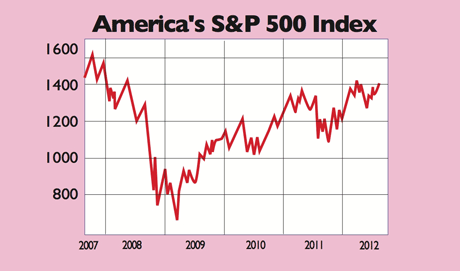
“A sense of Olympian wellbeing appears to have taken over” stockmarkets, says John Authers in the FT. European stocks have gained almost 20% since early June and are at a one-year high. The S&P 500 has returned to its post-crisis high.
But the rally is defying the fundamentals, says Morgan Stanley. The US economy remains lacklustre, the eurozone weakened further in the second quarter, and “for all the official assurances that the second half of this year will be better for the Chinese economy, thus far the evidence in support of this contention is thin”, says Fxpro.com. Growth in exports, industrial production and loans continued to slow in July.
Earnings are reflecting the decline in global growth forecasts. In the past three months, European earnings estimates have fallen by 10%, while expectations for 2013 “are too high”, according to Morgan Stanley’s Graham Secker. Profit growth of 12% next year looks a real stretch; Morgan Stanley is pencilling in 2%. American firms, meanwhile, have become increasingly pessimistic about their profit prospects for the third quarter.
Once again, investors seem to be counting on central banks coming to the rescue. But as we have often pointed out, money printing by the British and American central banks has hardly produced economic miracles, and there is no reason to think it’ll be different this time.
As for eurozone rescue plans, European Central Bank president Mario Draghi’s proposal to lower peripheral bond yields with large-scale purchases, provided troubled countries sign up to an official rescue package, has impressed investors. But it faces resistance from Germany’s Bundesbank, and ongoing “rescue fatigue in northern Europe and austerity fatigue in southern Europe” could also temper its impact, notes the Economist. Meanwhile, jitters over a Greek default and euro exit could well flare up again now that Greece is back in the spotlight.
Adding to the impression of market complacency is the drop in the US VIX index, a gauge of investor expectations of volatility, to a six-year low. In other words, Wall Street’s ‘fear gauge’ is at pre-crisis levels. All this presages a setback in world equities. Still, that means European equities – which, as we have noted, are already a long-term buy on valuation grounds, provided utter disaster is avoided – can be bought more cheaply in the months ahead.